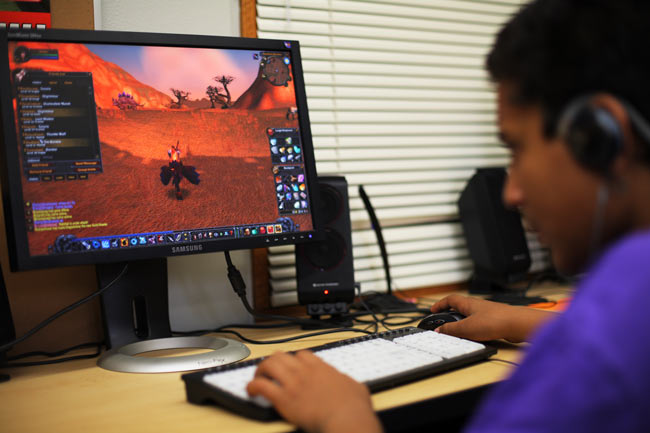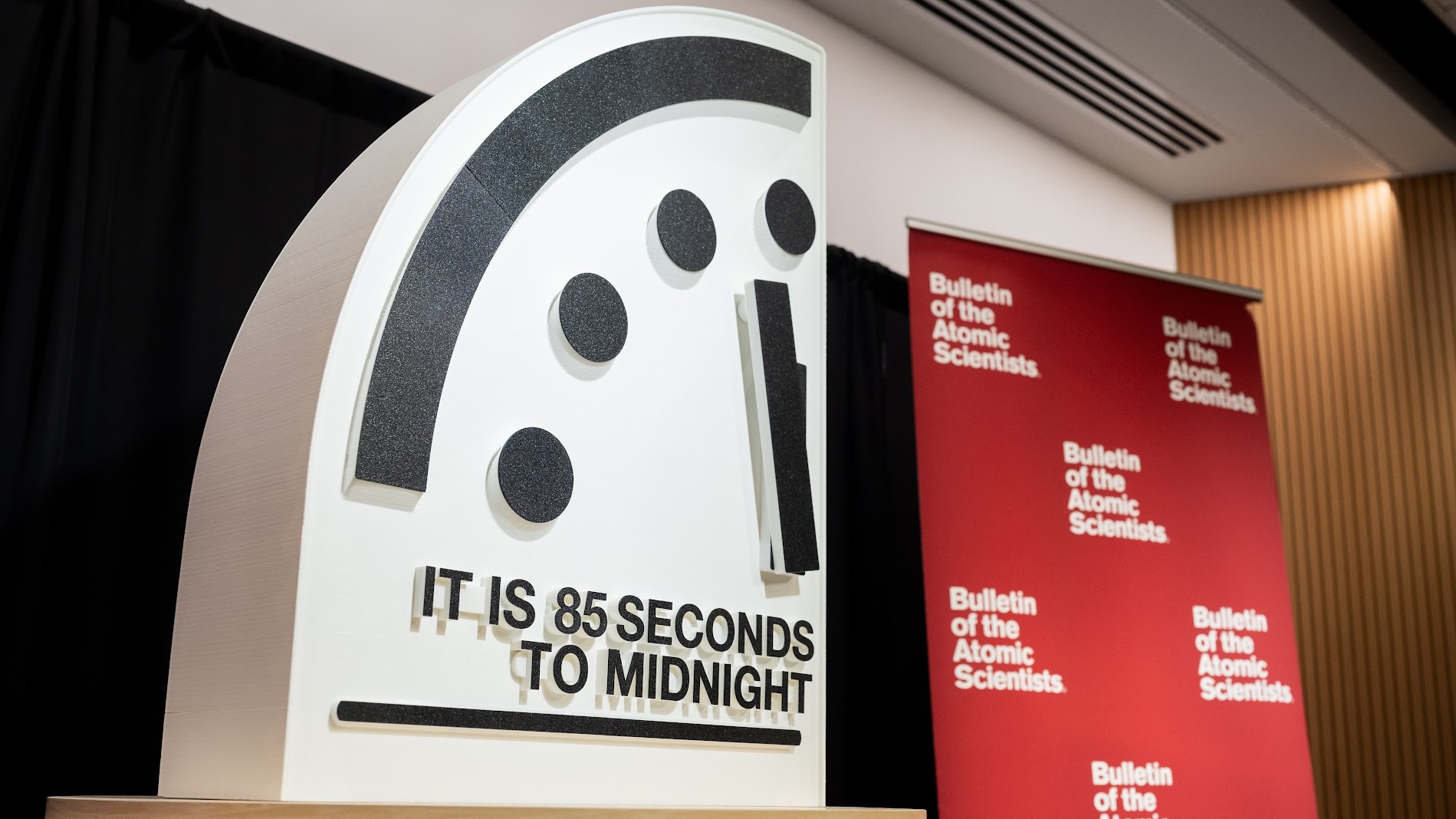World of Warcraft Video Game Succeeds in School

It's not unusual for video game players to speak of a routine that involves ordering pizza, getting a sugar jolt, and then playing "World of Warcraft" for hours. But the person talking in this case is Constance Steinkuehler, an educational researcher who organized an afterschool group for boys to play, for educational purposes, the massively multiplayer online role-playing game.
Some of the eighth graders and high school freshmen who signed up for the group couldn't have cared less about writing or reading in school. Yet those students have gone from barely stringing together two sentences to writing lengthy posts in their group's Web site forum, where they discuss detailed strategies for gearing up their virtual characters and figuring out tough quests.
"It has worked ridiculously well," Steinkuehler said. "It shouldn't be working as well as it is."
{{ video="LS_080929_world_warcraft" title="Video: Entering the World of Warcraft" caption="Researchers look at the educational benefits of the World of Warcraft game. Credit: Livescience.com, Blizzard Entertainment, Constance Steinkuehler." }}
Video games are also being embraced by some advocates of "unschooling," a type of home schooling that puts kids more in charge of the curricula. Guess what — the kids want to play video games. But they also learn everything from math skills to social skills along the way.
The unschoolers' experiences, along with the early success of Steinkuehler's program, suggest that playing a video game set in a virtual online world can encourage students to learn valuable real-world skills. Steinkuehler's goal is to figure out when and how learning takes place in online games, and how popular games made for entertainment might become educational tools.
An online reeducation
Get the world’s most fascinating discoveries delivered straight to your inbox.
"World of Warcraft," known to its players as "WoW," provides something of a ready-made experiment for researchers to see how games can affect players. The game, published by Blizzard Entertainment, boasts a bigger population of players than most U.S. cities, with more than 10 million subscribers worldwide paying a monthly fee to run around the virtual land of Azeroth. Players get more powerful as they gain experience and levels by killing monsters and performing quests together, eventually working their way up to level 70 with the latest game expansion.
Unlike many games that have an online component, massively multiplayer online games such as WoW require players to invest much more time in creating a character and participating in an online community. Gameplay revolves around social activities, such as groups of players cooperating on a quest or forming large "raid" groups to tackle the toughest game bosses. Websites and forums have sprung up around WoW, where players trade strategies, share stories and debate the finer points of gameplay.
Online fantasy worlds may seem too disconnected from real life to have educational value, but Steinkuehler, at the University of Wisconsin-Madison, and Sean Duncan, her colleague there, have found otherwise. Their earlier work analyzed forum postings on the official WoW Web site, and found that 85 percent of the conversations showed that players had decent levels of scientific literacy. Players used reasoned arguments, backed up hypotheses and even brought statistics to bear on issues that they faced near the higher levels of the game.
Numbers like that "shock even the gamers," although Steinkuehler points out that gamers who post in forums do not represent the average WoW player. A majority of players probably just read the forums and don't participate in the more sophisticated online discussions.
However, the high level of thinking represented in the forums still confounds expectations that most online chatter represents lowbrow mom jokes and gossip. The question for researchers becomes how to translate observations about online worlds into real-world results that impact the lives of students.
"What I'm deeply invested in is reinvigorating their intellectual life," Steinkuehler told LiveScience. "I want kids to understand that games are intellectual and about problem solving, not that different from what scientists are doing in the real world."
Unschooling in World of Warcraft
The idea will probably prove a tougher sell for parents who tell their kids not to play video games until they finish their schoolwork.
They might want to talk with Jill Parmer. The full-time mom plays online games alongside her kids whenever they like, and helps lead a group of homeschool kids and parents in a WoW guild called "Horde of Unschoolers."
Many homeschoolers still study with textbooks, but the unschooling philosophy does away with the trappings of formal education. Each unschooling household has its own twist that boils down to parents following and encouraging the interests of their kids.
Parmer first struggled to get her son Luke and daughter Addi to learn certain subjects, and watched them zone out. So she read up on the unschooling movement, despite her husband's uncertainty about taking the kids completely out of school.
"Their interest is going to lead to learning," Parmer said. "So I calmed down and I watched them play games, and I played with them."
She has watched Luke, 10, make his own learning connections between WoW and other areas in life. One day he became interested in the mathematical concept of exponential increases after his WoW character encountered a disease cloud.
"Just in his ponderings, he asked 'Mom, what if someone got infected and he walks into a room with four people, and they leave and each walk into a room with four people?'" Parmer recalled. She told him, yes, that could happen, and added another fact about not all people getting infected at the same rate in the real world.
Another unschooling mom, Kelli Traaseth, saw kids improve their literacy through online games such as WoW. The results are strikingly similar to what Steinkuehler has witnessed in her afterschool group.
"We know several kids who learned to read while playing these games," Traaseth said. "If you want to classify some of the things we're doing when we play World of Warcraft, the list could include math, reading, sociology, economics, creative writing and communications."
Fighting gamer stereotypes
Unschooling's radical approach and its extension into an online game still make many people react with disbelief or outright hostility. When Parmer got a profile in the online gaming publication "WOW Insider," a flood of comments appeared that included unkind words about Parmer's family.
"No, my kids are not fat slobs. They are quite slender," Parmer noted, remembering some of the harsher comments. "Warcraft is only one part of things that they and we do in life."
Luke plays daily in WoW with other kids that the family met at a gathering of unschooling families. Addi, 14, currently takes more interest in roller skating, but still logs into WoW to organize group activities. Parmer jokingly calls Addi the "creative director" of the unschooling guild.
Perhaps the key to unschooling, whether online or in the real world, is that parents willingly become full-time teachers who accompany and play with their kids. Unschooling does not mean leaving children to watch television or play World of Warcraft on their own all the time — that's called "neglect," Parmer said.
Traaseth also suggested that parents devote particular attention to playing with their younger children when first getting into online games.
"The social skills that kids learn in a virtual world are incredible, and there is a particular type of etiquette that you have to use and to communicate with others through written text is extremely complex," Traaseth said. "So for younger players it makes everything so much smoother if a parent is there to help."
Kids will be kids
Online games continue to gain traction as educational tools in professional circles. Steinkuehler's research received positive buzz at the American Psychological Association's annual convention this year, marking a different tone for an organization that had previously focused more on condemning video game violence. Even NASA has commissioned game developers to help create its own space-themed online game.
Yet turning video games into a positive force for the future still requires answering some questions from the past. Steinkuehler has a particular interest in helping boys from working class families who are getting left behind in schools.
"Boys are the biggest consumers of games, and it's boys who are predominately falling out of school," Steinkuehler said, pointing to the 65 percent graduation rate for male students nationwide. "I can't do all these studies without asking why the biggest consuming population of games isn't doing well in school."
Steinkuehler can draw encouragement from the first year of her pilot afterschool program, which will run again from October 2008 through May 2009. She did not even get a chance to recruit before she had a line of parents asking if their boys could get in. Some drove to Madison, Wisconsin, from as far as two hours away.
A mix of regular students and homeschooling kids got together to play for several hours after school each day, with a doctoral student or volunteer staff taking turns "lifeguarding" the group. Everyone also met one Saturday out of the month at the University of Wisconsin campus. There the group collaborated on activities such as writing and designing the guild Web site, or putting together graphic novels based on World of Warcraft adventures.
The Saturday event gave Steinkuehler an opportunity to talk individually with the students and get feedback for their research funded by the MacArthur Foundation. Her next research proposals may tackle online games played by younger kids, such as Runescape, where she suspects the learning curve is different from that of teenagers.
Solid numbers on student progress will have to wait until the research project runs its course, but one early lesson is clear. Like the unschooling parents, Steinkuehler has found the greatest success in following the interests of her students, rather than forcing educational content on them.
"I don't want to turn a play space into work place," Steinkuehler said. "Frankly that would rather suck for everyone, including me."
- Video - Entering the World of Warcraft
- 10 Technologies That Will Transform Your Life
- 'Star Trek Online' is Ready to Beam Up
 Live Science Plus
Live Science Plus






